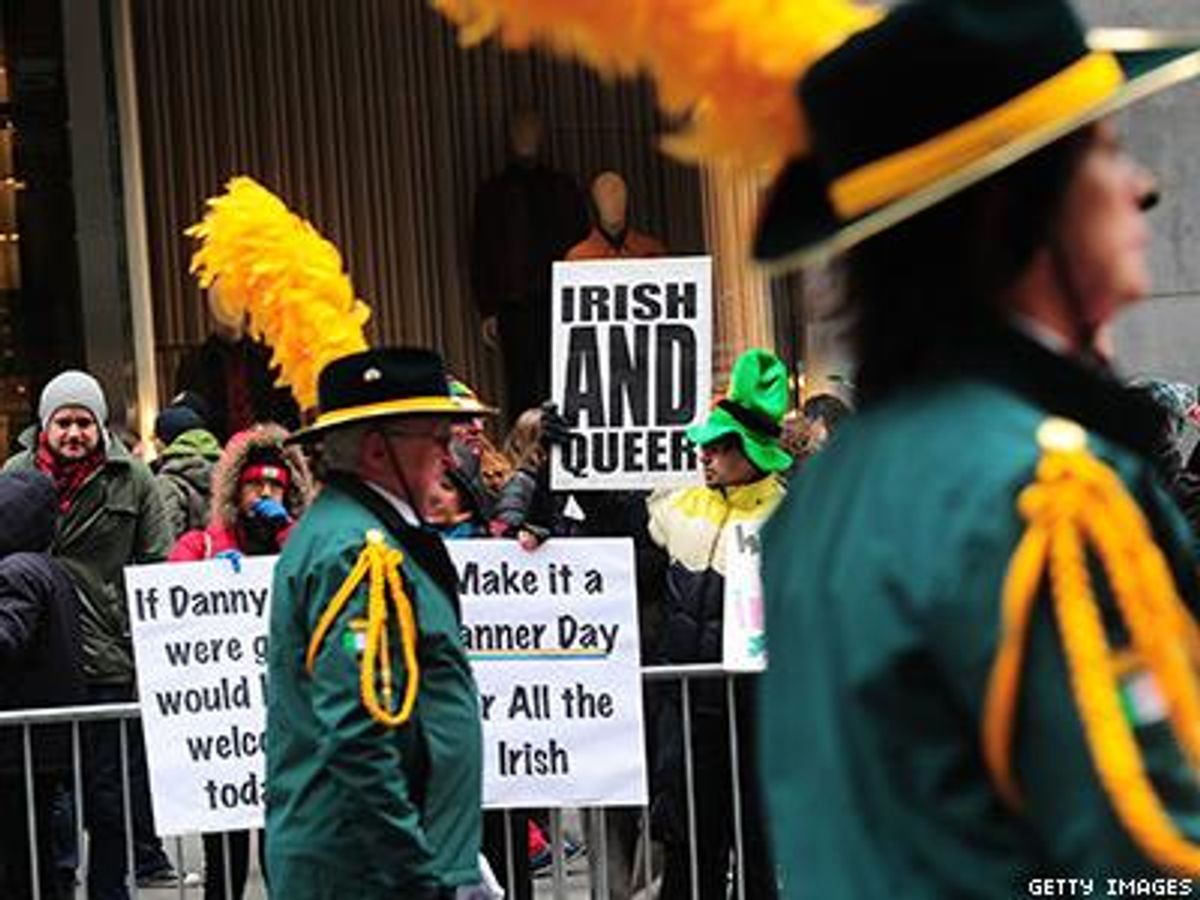For the second year in a row, New York Mayor Bill De Blasio has decided to boycott the New York City St. Patrick's Day Parade for its refusal to welcome LGBT groups into its ranks. Admittedly, the parade's organizers have made a small concession for 2015: For the first time in the parade's 253-year history, an LGBT group is being included in the march down Fifth Avenue. But it's just one group, and it happens to represent NBC, the network that televises the parade every year, leaving the unfortunate impression that the organizers are more concerned with appeasing their broadcaster than doing what is right. As De Blasio told reporters, this gesture "is too small a change to merit a lot of us participating."
Skeptics and critics might wonder why the Fifth Avenue St. Patrick's Day Parade is facing so much pressure. As they correctly point out, the parade doesn't forbid all gay people from marching, just groups that identify as gay. What's the big deal?
The big deal is that the parade's refusal to recognize LGBT people as equals flaunts our highest ideals as Americans, licenses hatred abroad, and violates the spirit of St. Patrick's Day.
Eighteen months ago, I was in Uganda with some of my colleagues from Robert F. Kennedy Human Rights, the organization where I serve as president. We were there to oppose the nation's Anti-Homosexuality Act, which criminalized same-sex relations and carried punishments up to and including life in prison. One evening, we had a reception at our hotel for some of our Ugandan friends. Afterwards, two of the attendees, both transgender, were arrested by the police and thrown in prison. My colleagues and I spent the rest of our trip working to secure their release.
That kind of hatred is legitimized when we in the United States fail to live up to our ideals. The world looks to the United States for moral leadership. As my father, Robert F. Kennedy, said, "Our country began as a center of hope, not only for those who came here, but for those who did not." When we contradict our fundamental belief that all people are created equal, it gives cover to those abroad who have little respect for that belief in the first place.
Fortunately, the New York City St. Patrick's Day Parade isn't the Five Boroughs' only celebration of the Emerald Isle. On the snowy morning of Sunday, March 1, I donned a green jacket, pulled on a pair of sturdy boots, and drove to Sunnyside, Queens, for the 16th annual St. Pat's for All parade, where I had the honor of serving as grand marshal alongside the Irish actor Brian O'Byrne.
At first glance, St. Pat's for All looks much like other community celebrations of the great Irish holiday. A troupe of bagpipers led the way, proudly sporting kilts despite the cold. A band on a flatbed truck played a brisk selection of jigs and reels. Local dignitaries, including Mayor De Blasio, waved to spectators. Against the white backdrop, flags of green, orange, and white flapped in the wind.
There was another flag on prominent display in Sunnyside: the rainbow banner that proudly represents LGBT people around the world (the inventor of the flag, Gilbert Baker, was in attendance). That banner is what sets St. Pat's for All apart. It's a celebration of Irish heritage, yes, but it's also a celebration of the diversity that makes this nation great -- not just sexual diversity, but racial, religious, gender, and ethnic diversity as well. The parade's motto, taken from the 1916 proclamation of the Irish Republic, echoes its spirit of openness: "Cherishing all the children of the nation equally."
Irish-Americans have a special responsibility to hold our nation to the highest principles. We are descended from people who left their homeland to escape discrimination. But when our ancestors arrived in America, they found only more bigotry. They were stereotyped as alcoholics and regarded as an inferior race. I remember my grandmother Rose taking me to the attic in her Boston home and showing me her scrapbook, which included advertisements that read "NO IRISH NEED APPLY."
For Irish-Americans, St. Patrick's Day is in large part about celebrating our triumph over that kind of prejudice. It's about celebrating our ancestors' belief that despite what others might say, the American promise was as open to them as it was to any other group.
Ultimately, their faith was validated. There's no better proof of the distance our ancestors traveled than the popularity that St. Patrick's Day now enjoys. Today, it's regarded as an American holiday, not just an Irish holiday. As the saying goes, "Everyone's Irish on March 17."
Unfortunately, the New York City St. Patrick's Day Parade continues to send a very different message. That's why I chose St. Pat's for All this year. I was proud to be part of such an inspiring display of tolerance, openness, and kindness.
But I nevertheless hope we're approaching the day when we no longer need a parade called St. Pat's for All, when everyone -- regardless of what they believe or who they love -- will feel welcome to call themselves Irish on March 17.
KERRY KENNEDY is the president of the Robert F. Kennedy Center for Justice and Human Rights.


















































































Viral post saying Republicans 'have two daddies now' has MAGA hot and bothered